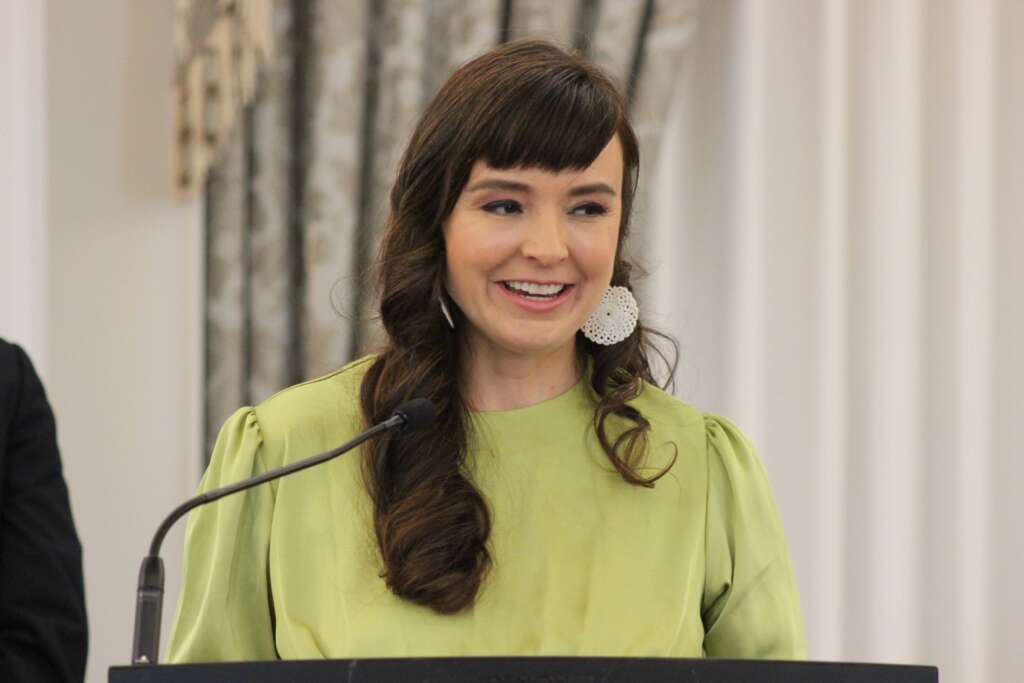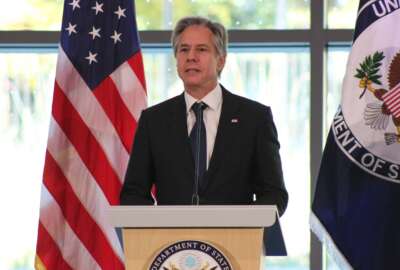Feds teleworking overseas got a pay raise. State Dept honors an employee who made it happen
The State Department is honoring Michelle Neyland, a congressional adviser for its Bureau of International Affairs who helped make a pay raise for Domestic Empl...
Some federal employees are taking remote work to a whole new level — holding government jobs while living overseas.
They’re called Domestic Employees Teleworking Overseas (DETOs). Most are the spouses of military and Foreign Service officers.
The federal government began the DETO program well before the COVID-19 pandemic. But with greater workplace flexibilities, the DETO workforce is growing.
Another big change is pay. Late last year, Congress passed language in the 2023 National Defense Authorization Act (NDAA) giving DETOs a locality pay equivalent. That legislation led to 265 DETOs seeing a significant pay raise.
Now the State Department is recognizing one of its employees for her advocacy on this pay issue.
Michelle Neyland, a congressional adviser for the department’s Bureau of International Organization Affairs, received this year’s Eleanor Dodson Tragen Award.

The award, presented by the Associates of the American Foreign Service Worldwide (AAFSW) and the Foreign Service Association DACOR, recognizes individuals for work that has “enhanced the global rights and benefits provided to the Foreign Service community.”
Neyland started working at the State Department more than a decade ago, as a civil service officer. She kept her job and started remote work two years ago, when her husband accepted a position at the U.S. Embassy in Bucharest, Romania.
Neyland said she was glad she’d be able to keep her job as a remote worker. But without locality pay, she soon “felt extremely disheartened” to learn that her base pay shrank by 30% for the same work she had been doing for years.
“Historically, civil service officers had never worked from abroad in great numbers and the pay policy has not kept up with the new reality,” Neyland said.
The 2023 NDAA requires civil service members under a DETO agreement to be paid the lower of two options: either what they would have been paid in the U.S., or what a member of the Foreign Service at an equivalent level is paid.
“As soon as it went into effect, people’s paychecks were adjusted and they started receiving equitable pay to their peers, more similar to what they were making when they were working domestically,” Neyland said. “So it hit and impacted families immediately, which made people really emotional and just grateful that we were able to succeed, because this was an issue that has persisted since 2009.”
Rep. Joaquin Castro (D-Texas) and Sen. Chris Van Hollen (D-Md.) championed the DETO pay issue in the 2023 NDAA. But Neyland and a coalition of her peers brought the issue to lawmakers in the first place.
“Everybody who I introduced this pay inequity to across State Department, as soon as they learned more about it, immediately said, ‘Well, how can we fix that? That doesn’t sound right.’ So I did not encounter anybody who wanted to keep the status quo as it was.”
State Department officials, at a Nov. 29 award ceremony, commended Neyland not just for her advocacy on this issue – but the speed at which Congress addressed the issue.
Neyland and her colleagues brought the issue to Congress, which passed legislation addressing the problem, all within the same year.
“I’ve heard a lot of amazement from people, which I understand, because it’s not an easy feat to pass legislation in only one year, from start to finish. We did work really, really hard. But also other factors played into that success, like the timing of our effort,” Neyland said. “I think it was the right time, a healthy dose of luck, and then a lot of people cooperating toward that outcome.”
Other State Department employees and DETOs also took note. Neyland said she recently found out 40 of her peers co-nominated her for the Tragen award.
“I’m really touched and amazed by [that]. I had no idea it was that big of a list,” she said. “But it just goes to show how many people are personally touched by this.”
The DETO program dates back to 2009, and is intended to provide more secure career options for spouses of military or Foreign Service members who are stationed overseas.
“It’s really been a lifeline for people in my situation. We have professional skills and education, and we’d really like some continuity in our careers and be able to keep sophisticated jobs going,” Neyland said. “When we have breaks in our careers, like what happened historically, before the DETO program, it’s harder to work in areas that we are passionate about, and to work at higher levels.”
Neyland said the DETO program is “still a hidden gem” across the federal government. But thanks to some recent developments, the program is getting more attention.
President Joe Biden signed an executive order in June, requiring agencies to develop common standards for DETO policies, “to promote consistency and effective coordination in the implementation of the DETO program across the executive branch.”
“I know the State Department took the lead on establishing the program and helps give guidance. But other agencies need to adapt it or make it work for their own people,” Neyland said. “I know that there are DETOs from all over the federal government, from the small agencies to the big ones. And it’s only been growing in popularity.”
Hank McKnelly, executive counselor to the commissioner of the Social Security Administration, told members of the House Oversight and Accountability Committee at a Nov. 29 hearing on telework that SSA is working with the State Department on creating a DETO program.
“We are developing our policy right now. In fact, it’s in the stages of being finally staffed and will be reviewed here in the next few weeks,” McKnelly said.
Generally speaking, it’s easier for prospective DETOs to be well-established in their federal careers before looking to work remotely overseas.
“Once you’re well-known in your office, it’s easier to have a remote work agreement approved — which is essentially what this is,” Neyland said. “But it’s not impossible, because I’ve also heard of people who have been hired as DETOs right off the bat, once they’ve interviewed for a job they just found on USAJobs. So, it’s always worth a try, just applying and explaining your situation and seeing how remote-work-friendly your office is.”
Neyland said recent State Department data shows that DETOs working there have served an average of 14 years.
It’s a win-win – federal employees get to keep their jobs – and federal agencies get to retain well-seasoned federal employees with specialized skills and training.
“By bringing our federal jobs with us abroad, that allows for continuity in our careers that our predecessors never had,” Neyland said. “I actually think that foreign affairs and military spouses are the federal government’s greatest untapped resource.”
The DETO program is also a lifeline for Foreign Service and military spouses who are often unable to hold non-federal jobs living overseas. Over half of Foreign Service spouses are unemployed and many others are under-employed.
Neyland said she felt empowered to advocate for pay equity because the department, having elevated diversity, equity, inclusion and accessibility issues, “now challenges all of its employees to do something above and beyond our job descriptions to make this a better … place to work.”
“My experience on this campaign, serving as a spark to bring the pay equity problem to the forefront, really made me believe that employees can make a difference in seemingly intractable issues like this,” Neyland said. “I would encourage people to take a look at what is holding them back — or maybe DEIA issues that are a problem in their agencies, and just start to shed some light on those, do some research and see if you can bring them toward a solution.”
Copyright © 2024 Federal News Network. All rights reserved. This website is not intended for users located within the European Economic Area.
Jory Heckman is a reporter at Federal News Network covering U.S. Postal Service, IRS, big data and technology issues.
Follow @jheckmanWFED






